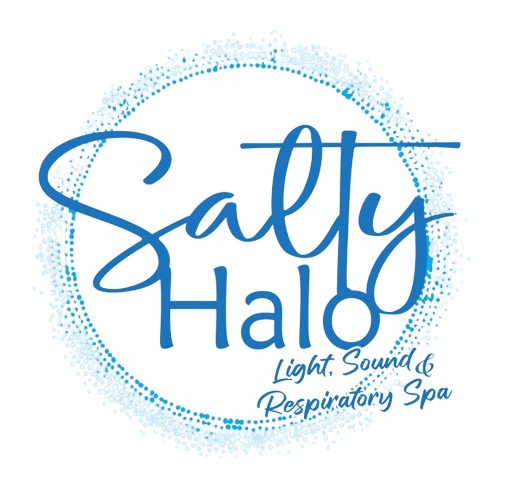Breathing Issues
Asthma
Asthma is described as a hypersensitivity reaction where the immune system triggers an inflammatory reaction that damages the airways to protect your body from allergens. Salt has anti-inflammatory and antibacterial properties that help clean your body from these allergens like mold, dust, pollens, and smoke – reducing your chances of an asthma attack.
Smokers Cough/Emphysema
When you have smoker’s cough/emphysema, you may experience shortness of breath and confusion due to the lack of oxygen. Halotherapy helps open the damaged air passages and clears them of harmful toxins, allowing you to breathe a little easier.
COPD
At Salty Halo we are dedicated to helping people alleviate their COPD at any stage of the illness. With less coughing and thinning of the mucus, you’ll find that less respiratory infections are possible, and you’ll breathe better.
Sinusitis
Sinusitis is caused by the applied pressure on the wall of the sinus cavity due to an infection or a build-up of mucus. The salty air in our salt booth can help cleanse your nasal cavity, helping to manage your body’s mucus production and nasal inflammation.
Allergies
Salt therapy soothes your airways and absorbs the irritants and allergens lining them. Therefore, the salt helps to lower your body’s immune response to allergens and inflammation, lowering your overall symptoms. With regular exposure to salt therapy, some people tend to notice less reliance on over-the-counter antihistamine medications over time.
Upper Respiratory Infection
Ever suffered from an upper respiratory infection? Boost your immune system and relieve sinus pressure with salt therapy. Your nasal passages will begin to open naturally, without the use of nasal sprays and decongestants. Not only are you alleviating your symptoms, but the salt is also working to help fight the infection and lessens the tendency of it coming back.
Does Dry Salt Therapy Really Help with Breathing Issues?
In short, the answer is yes. Yes, salt therapy really does improve common respiratory issues like asthma, severe asthma, allergies, bronchitis, chronic bronchitis, COPD, and sinusitis. But don’t take our word, as we are in the salt therapy business. Instead, take the word of scientist and doctors who study the effects of salt therapy on people suffering from breathing problems. Widely researched in Europe, as salt therapy is just growing in in the US, dozens of studies support the efficacy of this natural treatment.
In a study of patients ages seven to sixty with various respiratory conditions, patients exposed to halotherapy (modern salt therapy) showed improvement in inflammation and allergic response and a decrease in the body’s sensitiveness and in infectious inflammatory process. This study also showed a need to continue salt therapy to maintain these benefits (1). Patients exposed to salt therapy had less inflammation, could breathe better and were less sensitive to their triggers.
For clients with Chronic Obstructive Pulmonary Disease (COPD), 393 patients were given one salt therapy session. In only one session, patients saw improved oxygen saturation of arterial blood (2). Another study with a mix of participants from healthy, at-risk for COPD, to has COPD and asthma, researchers found that 3-months of salt therapy two times per week dramatically improved healthiness and quality of life. Of those receiving treatment, there were 14 cases of acute respiratory viral infections and 104 days of symptoms vs. the control group who did not receive treatment and had 55 cases of acute respiratory viral infections and 585 days of symptoms. The study included 160 people, both male and female, and various age groups participated (3).
A small study using those with chronic bronchial patients, research found salt therapy provided anti-inflammation and phagocytosis. Phagocytosis is the process where phagocytes, a type of cell in the body, encompass bacteria or viral particles and destroy them (4). Once encompassed, the bacteria or viral particle dies.
How likely is salt therapy to help? One study found that 72% – 87% of those with nasal pathology found improvement with salt therapy. Sixty percent of those with chronic sinusitis saw improvement while 90% with acute sinusitis saw improvement and reduction in mucosa after just two to three sessions (5). In a different study, salt therapy improved drainage in 85% of cases with moderate asthma, 75% of severe asthma cases, and 97% of chronic bronchitis and bronchiectasis. Furthermore, this study found that common cold cases were reduced in half. And those at risk for lung disease had significant changes (6).
For anyone considering salt therapy, salt has a positive impact on the nervous system, mucosal surfaces, extending to salivary glands, middle and an inner ear (ear infections), sinus cavity gingival zone, oral cavity as well as physical lesions (7).
While it seems a bit ‘hocus pocus’ to some, science shows that salt therapy has very positive effect on those with respiratory issues as well as for healthy individuals wishing to reduce the likelihood of colds, flu and virus.
1.Surveys on Therapeutic Effects of “Halotherapy Chamber with Artificial Salt-mine Environment” on Patients with Certain Chronic Allergenic Respiratory Pathologies and Infectious -Inflammatory Pathologies; Lazarescu H, Simionca I,Hoteteu M, Munteanu A, Rizea I, Iliuta A, Dumitrascu D, Dumitrescu E National Institute of Rehabilitation, Physical Medicine and 2.Balneoclimatology,Bucharest, Romania; 2014
SaltMEd – The Therapy with Sodium Chloride Dry Aerosols; B. Oprita, C. Pandrea, B.Dinu, B. Aignatoaie Dep UPU (Emergency Ward) SMURD Bucharest Emergency Hospital, 2010
3.Sodium Chloride Aerosol Against Acute Respiratory Infections, Alina Chervinskaya St. Petersburg, 2009
4.The Sweet (and Therapeutic) Truth About Salt Caves, US News and World Report, 2017
5.Halotherapy of Respiratory Disease, Alina Chervinskaya, Clinical Research Respiratory Center, Saint Petersburg, 2003
Respiratory Hygiene in Health Resort Medicine, Alina V. Chervinskaya, Baltic Association of Aerosol Respiratory Hygiene at the 35th Congress of the International Society of Medical Hydrology & Climatology, 2006
6.Research on NaCl saline aerosols I. natural and artificial sources and their implications. Environmental Engineering and Management Journal. 9. Sandu, Ion & Chirazi, Marin & Canache, 7.Maria & Alexianu, Marius & Sandu, Andrei Victor & Vasilache, Viorica. 2013

